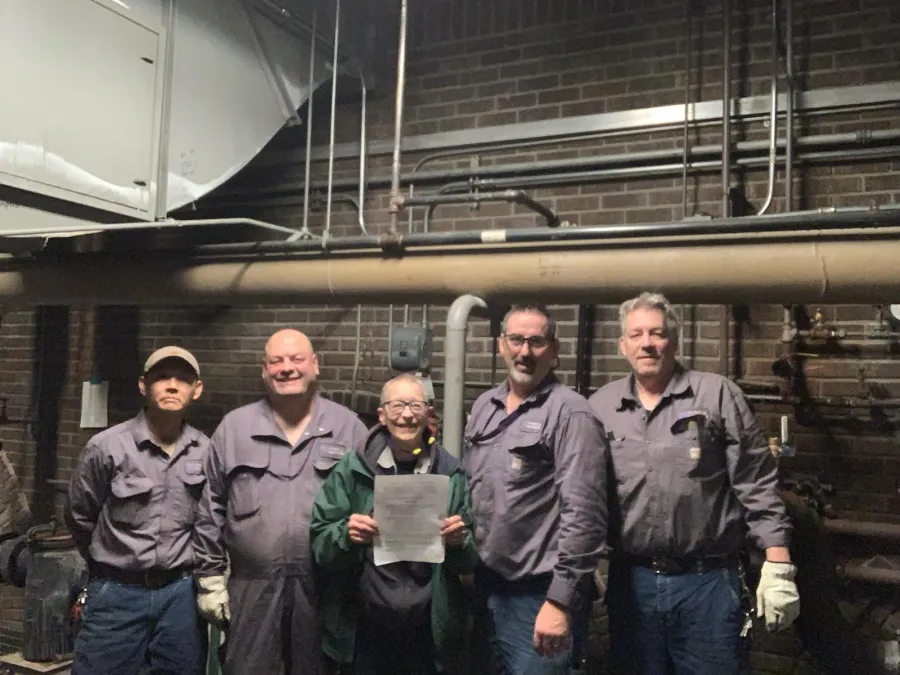UW Plumbers & Pipefitters Win Grievance Against Contracting Out

At the University of Washington (UW), seven WFSE plumbers and pipefitters relied on the power of their union to stop their employer from hiring outside contractors to complete two large projects that were rightly their work. Thanks to solidarity and knowing their rights, they won the grievances they submitted.
When they received notice of the need to replace major machinery, WFSE members in the plumbing and pipefitting shop planned the two projects and coordinated with union steamfitters—but employer-side preparations for the project continued to lag.
As a result, the need to complete the replacement became urgent. Chronic underfunding and understaffing in the shop meant the union workers were already working overtime on other critical maintenance, and the decision was made to contract out the replacement projects.
Jeff Hnilo is a member of WFSE Local 1495 and has been a union plumber at the UW for twenty years.
“We do the best we can and I’m happy to be there with the people I work with,” Hnilo said. “But it’s unfortunate to see the UW spending more for less to hire outside contractors.”
WFSE members only discovered that outside contractors had been hired by chance, when a crew came into the union shop asking for access to the workspace.
Fortunately, these workers knew their rights.
WFSE Local 1495 President Paula Lukaszek led the charge on filing two grievances to ensure their union work remained in-house, an effort that led to cash settlements for each of the union tradespeople in the shop.
“I hope all WFSE members realize that contracting out is not just about trades,” said Lukaszek.
“If you don't have a contracting out article in your contract, try to get one. Members need to protect their work and jobs by not letting management contract out your work.”
Outsourcing, or the hiring of outside contractors, is often known as “contracting out,” and it has serious consequences not only for workers but for the Washingtonians who rely on skilled, qualified public employees’ work.
Contracting out can also lead to increased accidents on the job site—and it’s often not an efficient use of public funds.
“It’s incredibly more expensive, just per hour, but also because there’s no institutional knowledge,” said Hnilo.
“You don’t have the people who work in the buildings every day. There’s a learning curve that’s very expensive, for every single job.”
According to a 2012 Rutgers’ School of Management and Labor Relations report, “the most common reason that local governments cited for bringing services back in house was decline in quality of service.”
Hnilo was glad to learn that the grievances had been settled in favor of the workers in his shop—but for this veteran of union trades, it wasn’t about the money.
“We’re accountable for the work we do every day,” Hnilo said. “My name is on it. They should be accountable from preventing us from doing our job. We’re happy to be recognized—it’s not really about the money, it’s about respect.”
WFSE members’ advocacy against outsourcing of public jobs has included introducing the 2018 Taxpayer Protection Act to improve transparency and accountability in government contracting—a legislative effort that the business community organized against and defeated.
Fortunately, member and community advocates came together in 2020 to successfully pass HB-1521, Providing for Accountability and Transparency in Government Contracting. Washington residents deserve to know their tax dollars are being spent efficiently and can be accounted for.
What can public employees do if they suspect their work is being contracted out?
Start by contacting your union representative and beginning the grievance process outlined in your contract. A grievance goes through several steps, and if it isn’t settled, it goes before the WFSE Statewide Grievance Committee (SWGC), a body of appointed WFSE members who look at the evidence and refer the grievance to mediation, pre-arbitration or arbitration if they determine a contract violation has occurred.
“I can attest that the Statewide Grievance Committee is supportive in protecting members work if you file,” said Lukaszek.
“The SWGC has been very supportive of fighting contracting-out grievances and preserving our jobs. It is possible to win money back for our members when their employer contracts out their work.”
Union membership is key to safety at work, preservation of good public jobs, and having a say in working conditions.
“I’ve been a union member for fifteen years prior to coming to the UW, so I’m a firm believer that union representation is the only way we’ll get ahead,” said Hnilo.
“Without union membership, you have absolutely no chances of being represented fairly. The employer will not take care of you the way the union will take of you, period,” he said.
“All the gains that we’ve made over the past twenty years I’ve been there have been through the union.”
Learn more about joining our union here.
